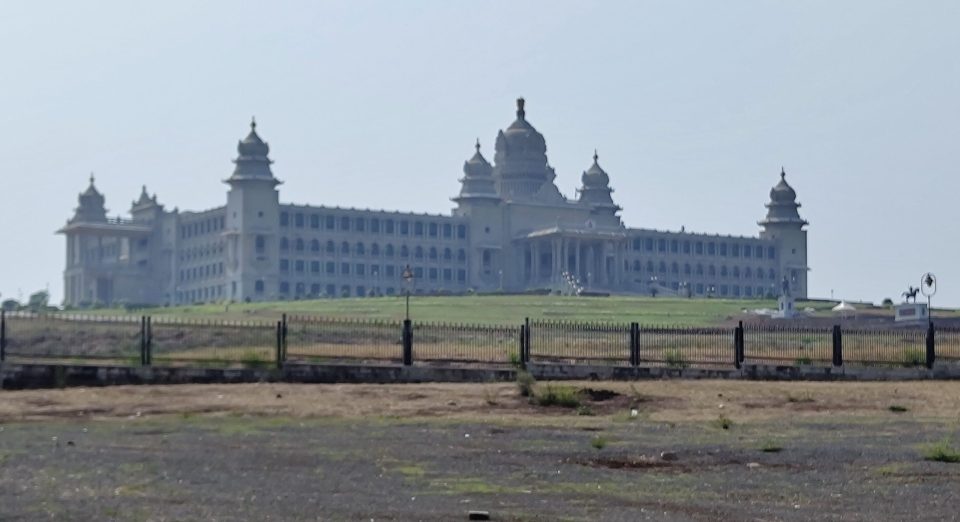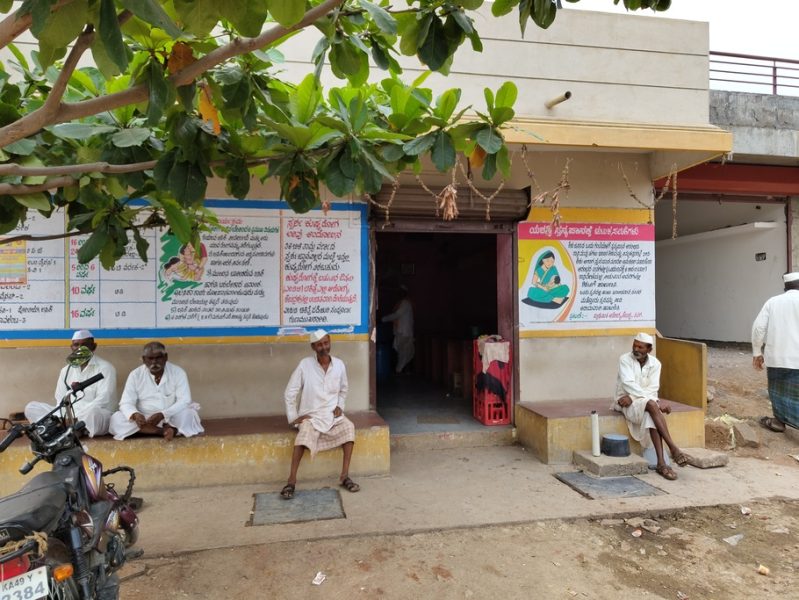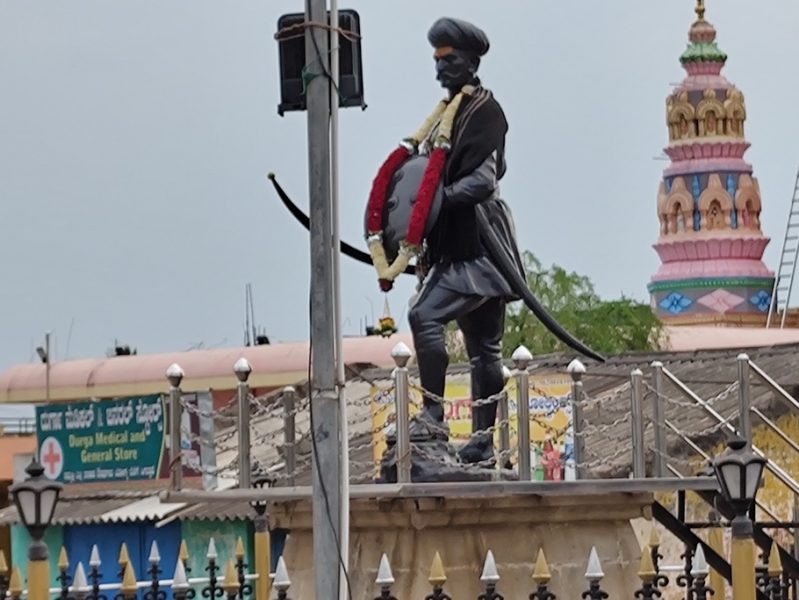
Belagavi: 3 factors that could swing poll results in Karnataka's biggest district

Three factors may sway the poll results in Karnataka’s largest district, Belagavi, which has 18 Assembly constituencies — i.e., the the Lingayat sub-sect Panchamasali, the sugar lobby, and the Kannada-Marathi linguistic dispute.
Currently, the BJP has a firm grip over the district, with 13 MLAs, while five are from the Congress. But this time, it won’t be easy for the BJP, as the Panchamasalis, who represent around 60 per centof the total Lingayat community, will play a major role in deciding the politics of Belagavi, and they are currently confused and unhappy with the incumbent BJP government.
Belagavi is an ancient, culturally glorious and historical place. The city of Belgavi has a rich cultural heritage due to the 2nd-century ancient cultures of Karnataka, Maharashtra and Goa states. And due to its proximity to the states of Maharashtra and Goa, the local Kannada culture has merged with the cultures of those states.
BJP’s hold over the region
Belagavi district borders Maharashtra state and a significant number of Marathi people live in Belagavi city, which comprises Belagavi’s North, South and Rural constituencies. As there are always provocations on language issues between the Kannada speaking people and the people who speak Marathi, there were several law-and-order issues that took place over decades. This was fanned by the Shiv Sena and its affiliated organisation Maharashtra Ekikaran Samiti (MES) from Maharashtra.
Also, in the British era cantonment area, the city faced several incidents of communal violence. Almost 25 per cent of the population in this city belongs to Muslims and earlier MES and pro-Hindu organisations had clashed over communal issues. These clashes largely helped the BJP to develop its hold in the area.
Individual power centres
Coming to individual power centres in the Belagavi region, the Jarkiholi brothers largely dominate over the region. Among the five brothers, Ramesh and Balachandra are currently in the BJP, while Satish represents the Congress. However, Lingayat leaders like Lakshmi Hebbalkar and Lakshmana Savadi will also play a major role in the elections.
Hebbalkar, ‘friend turned foe’ of Ramesh Jarkiholi, and backed by Congress strongman D K Shivakumar, was the reason Ramesh had quit Congress and which eventually led to the collapse of the JDS-Congress coalition government in 2019.
The bad blood between Ramesh Jarikholi and Lakshmi Hebbalkar is all set to spill over in this election, as the latter is already deliberating fanning the ‘Panchamasali’ issue against the BJP. While Ramesh, who is standing from Gokak, is pushing for Maharashtra Ekikaran Samiti candidate to win in the Belagavi Rural constituency, from where Hebbalkar is contesting.
Ramesh Jarkiholi, who lost his ministerial berth after he was caught in a sex tape scandal, continues to wield a lot of power in Belagavi politics. However, the Jarkiholi brothers, who hail from the Valmiki community (ST), could easily command 20 per cent of the SC/ST community vote in the district. But, now this vote may get spilt between the Congress and the BJP.
Also read: Jarkiholi brothers: The famous 5 with deep roots in Karnataka politics

The Panchamasalis
The recent hike in the reservation percentage for the Lingayats has not convinced the Panchamasalis, who fought for three years to get a Backward Class quota under the 2A category of reservations.
After a visit to Belagavi city, Belagavi rural, Gokak, Arabhavi, Athani, Yamakanamradi, Hukkeri etc.; the Federal found the Panchamasali community, who represent around 60 per cent of the total Lingayat community and considered to be the BJP’s vote bank, are still confused over BJP government’s recent decision on the reservation quota.
Rangappa Eerappa Gadli, a Panchamasali leader in Belagavi, told the Federal, “We are not happy with the government’s decision on increasing the reservation percentage, which will eventually not materialise because of legal issues.”
Gadli pointed out, “Our community is divided on this issue and votes may split between BJP and Congress. The seers of the Panchamasali mutts have also not been convinced and they have sent indirect messages asking us to decide on our own who to vote for. Earlier, they used to send messages to vote for a particular party.” (The Supreme Court is hearing the case after Muslims sued the state over their reservation being scrapped and distributed among Vokkaligas and Lingayats.)
The Kuruba factor
The Kuruba community (to which former CM Siddaramaiah belongs to), makes up around 10 per cent of the population in the region. Most of the members The Federal spoke to in Belagavi expressed loyalty towards one of the Jarkiholi brothers. In other places, they want to vote for the Congress, as they want to see their leader Siddaramaiah as the Chief Minister again.
Also read: SC defers till April 25 hearing on Muslim quota in Karnataka
Parasappa Rajappa, a Kuruba leader in Gokak, said: “For decades, we have supported the Jarkiholi brothers. We do not support any party, as they have contested from the JDS, the Congress, and the BJP. Most of us voted for whichever party they were in at a particular time. We have an emotional attachment with the family because our boys get enough support from them. Rameshanna, Balanna, and Satishanna (Jarkiholi brothers) listen to our problems and solve any issues, including land disputes, family disputes, group clashes, etc.,” he said.

Sugar lobby
Another important factor is the sugar lobby, which is a major tool for any politician in Belagavi to control voters.
The region is famous for growing sugarcane and houses 24 sugar mills. Thousands of farmers grow sugarcane and depend on sugar mills to sell their products. The factories produce jaggery, molasses, methanol, and ethanol products, ensuring farmers’ livelihood. The products are exported to various other states, as well as other countries. Apart from sugar, the liquor lobby, too, has strong control over the farmers.
Interestingly, several politicians in the region, belonging to all major parties, own sugar mills. “They have direct access to farmers and pay them good money and keep them happy. The farmers have a strong bond with mill owners like the Jarkiholi brothers, Lakshmi Hebbalkar, the Katti brothers, etc., and they normally support their owners in the elections, no matter which party they belong to,” said Bhimesh Nayak, a local BJP leader of Arabhavi.
Also read: In Karnataka’s Mandya a farmers’ outfit aspires to take on the BJP, JD(S)
However, Ramaji Nayak, a sugarcane farmer, said they have a demand for more benefits earned from sugar by-products. The sugar industry has a turnover of crores of rupees, which is used during the elections but not for farmers’ benefit, he added.
Nevertheless, the sugar industry will play a big role in the elections. Notably, Ramesh Jarkiholi said a few months ago that he was ready to pay ₹6,000 per vote against his opponent, who is offering a tiffin box and pressure cooker worth around ₹800 in the wholesale market. Ramadas Joshi, an activist, said politicians are making such statements because they have excess money from the sugar industry.
Linguistic dispute
Belagavi is mostly known outside the state for its Kannada-Marathi linguistic dispute. Mainly Belagavi city, which is divided into three legislative constituencies, including Belagavi Rural, Belagavi South, and Belagavi North, has a big number of Marathi people, who can decide the elections.
Decades ago, MLAs from the Maharashtra Ekikaran Samiti (MES) used to represent Belagavi in the Karnataka Assembly. Now, the internal tussle of Ramesh and Hebbalkar have ensured the entry of MES candidates again. While Hebbalkar managed to get a Panchamasali leader to contest against Ramesh, the latter managed to push an MES leader against Hebbalkar to divide the vote share.
MES has fielded Nagesh Mannolkar from Belagavi Rural, Ramakanth Hunduskar from Belagavi South, and RM Chougule from Belagavi North. These candidates have the support of the Marathi community and can divide the Hindu votes. At least they will be a threat to both the BJP and Congress candidates.
Also read: Law, politics, emotions: Karnataka-Maharashtra’s 8-decade Belagavi row
Praveen Kumar, a member of the Kannada Rakshana Vedike in Belagavi city, claimed the Maharashtra government was egging the Marathi community to go against Karnataka. “This is not right, and we are against those initiatives and support Kannadigas. Recent incidents, where the Maharashtra government provoked the border villages in the districts by offering health benefits, etc., will be an issue in the elections,” he said.
Arjun Shankar, an activist in the Marathi organisation, denied that his community was against the Kannadigas. “But we are being insulted by a few Kannada organisations for silly reasons. We want our MLAs to represent us in the state Assembly and speak about our issues,” he said.
Parties’ caste equations
The Congress has given tickets to Lingayat candidates in 10 out of the 18 constituencies in Belagavi. Six of them belong to the Panchmasali community. The movement led by Basava Jaya Mruthyunjaya Swamy of Kudala Sangama to include the Panchamasalis, a Lingayat sub-caste, in the OBC 2A category had a huge success in the district a couple of months ago.
The Congress’s strategy seems to be to tap into the power of the Panchamasali movement by giving maximum tickets to Panchamasali leaders in the district. The party has given tickets to Hebbalkar in Belgaum, AB Patil in Hukkeri, Ganesh Hukkeri in Sadalaga Raju Kage in Kagawad, Dr Mahantesh Kadadi in Gokaka, and Babasaheb Patil in Kittur.
Meanwhile, the BJP has given only three tickets to the Panchmasali community — Mahesh Kumthalli in Athani, Mahantesh Dodagouder in Kittur, and Ratna Mamani in Savadatti. However, the BJP has given eight tickets to the Lingayat community in all in the district.
The BJP’s prestige in the district suffered after prominent Lingayat leaders Lakshmana Savadi and former minister Shasikanta Naik (ST) left the party. The Lingayats of the district have also expressed displeasure against the BJP for denying a ticket to senior leader and sitting MLA Mahadevappa Yadwada in Ramdurg.
Lingayat leader Jagadish Shettar’s exit from BJP will also have an impact on the region. However, the BJP has given three tickets to the Banajiga community, another sub-caste of Lingayats (Shettar belongs to this community). It has fielded Ramesh Katthi in Sadalaga, Nikhil Katthi (Late Umesh Katti’s son) in Hukkeri, and Jagadish Metagudda in Bailhongal.
Also read: Karnataka: Seeking separate religion, Lingayats return to their radical roots
The Banajigas also have their stake in some parts of Belagavi, including Hukkeri, Ramadurga, etc. Thus, the BJP has opted for their candidates. The Congress has fielded Banajiga candidates, too, including Mahantesh Kaujalagi (Bailhongal) and Ashoka Pattana (Ramdurg). Shettar’s impact will be felt in these constituencies, and the BJP may face a tough fight, said Naresh Patil, a BJP party worker in Belagavi city.
The “non-issues”
When The Federal asked people about issues such as Ramesh’s sex tape scandal, they seemed unfazed. A woman shopkeeper said their support was for a leader and they were not worried about the scams. Interestingly, price rise, corruption, and similar issues are not considered election issues at all. Castes, language, and individual loyalties are more at work.
Overall, it seems the Panchamasali Lingayats will play a major role in deciding the future of Congress and BJP candidates in around 15 constituencies, whereas the Kannada-Marathi issue will have an impact on the city constituencies. The sugar industry will play a role in attracting votes with its money power.

